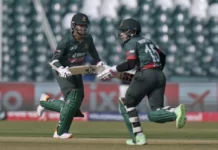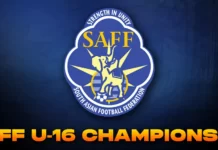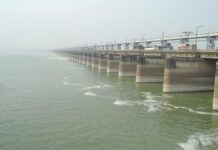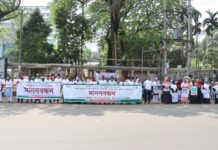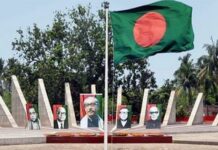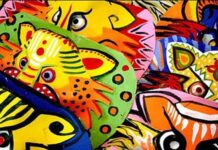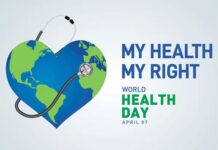Shekhar Kanti Ray:
The day before the first lockdown of this year in April, the people of Jaliapara were found little frustrated about the uncertainty of the coming days. Jaliapara is home to around 450 fishermen’s families in Chakaria Pourashava (Municipality) of Cox’s Bazar district. The dilapidated roads, all but few houses made of poor construction materials and the deplorable situation of drainage and sanitation system speak about the woes of the fishing community.
The fishermen of Jaliapara are mainly wage earners. Ashraf Ali (48), president of Bangladesh Khudra Mathshojibi Jele Samiti of Cox’sBazar district chapter (Bangladesh wage-earning fishermen’s Association) and a resident of Jaliapara told that the members of their organizations work in the fishing boats of the rich fishermen on a contract basis. The fishing season usually lasts for nine months and a wage-earning fisherman gets Tk. 1,00,000 to 1,50,000 for a season. If a fisherman fails to go fishing, then a certain amount (around Tk. 4,000) is cut from his payment. 
Moreover, the fishermen are not entitled to any compensation if they became sick or die during fishing. During the lean period in the rainy season, a few fishermen get engaged in other occupations like rickshaw-van pulling, making fishing nets but others stay idle at their homes. Ashraf Ali guided us to visit different parts of Jaliapara and talk to the fishermen and their family members.
Nurul Amin (44) was describing how the fishermen manage their families with their earnings, “We cannot properly run our family with this less income. As a result, we have to borrow money round the year and most of our earnings are spent for repaying loans. We have always been in a trap of loan and interest.” His neighbour Shahor Mallik (45) added, “If we feel sick in the sea, we take medicine on our own. No one cares about our sickness.”
Fishing in the sea has always been a profession with risks and financial uncertainty for the wage-earning fisherman but they have literally no other option but to continue this age-old occupation. Md. Rofiq Driver (50) who runs the engine in a fishing boat was narrating how risky his profession is, “My works in the fishing boat is very much risky than others. If a robbery happens in the boat the robbers will at first attack the boat driver to take over control of the boat and during a natural disaster like cyclone the drivers are always at risk to save others.” Jamaluddin (47), another fisherman told that he had an accident when he was taking fishing gear to the boat and his one arm was broken. Since then, he cannot go for fishing in the sea. He sells fish in the market and tries to manage his family with his little income. It is difficult for him to take three meals in a day with little income. “We are the most vulnerable than others,” lamented Jamaluddin.
The pandemic and the lockdown have made economic hardship for this community people especially for the women who are to bear the brunt of the occupational crisis of the male members of their families. Jahanara (45) is one of those who becomes helpless when her husband and son go to the sea. She cannot manage the family with the money she gets from her son and husband. And how does she manage those days? Jahanara replied, “Sometimes I sell my labour in plucking chili from the chili field. Sometimes I manage loan from others. But getting loan from NGOs and other sources has become difficult due to pandemic because we cannot pay installment timely.” Anarkoli (40), another woman of this community informed that, she goes through mental ordeals when the male members of her family go for fishing. When she falls in financial crisis her neighbors come to her rescue. Meher Jannat (22) and Minunnahar (24) reflected on the horrible condition of education for their children. According to them, the children of their community cannot attend online classes due to poverty. Moreover, there is no such educated person in their community who can teach their children.
Though the members of fishing communities get some supports from the Pourashava (Municipality) but those are inadequate compared to their needs. Ashraf Ali was explaining the situation, “We need more supports for our survival in this difficult time. Our community members don’t have any other skill to earn from other sectors. We also demand for life insurance and compensation to recover our losses during fishing in the sea. Our representatives need to be included in Disaster Management Committees so that we can raise our voices on our rights.” 
Shahana Begum, Executive Director of “Karmaneer Samajik Mohila Unnayan Sangstha (KSMUS)”, a local Civil Society Organization (CSO) of Chakaria, reflected on the issues of women in the fishing communities, “The women of the fishing communities are deprived of their basic needs and rights. The families without male members are in big crisis. When a fisherman dies or becomes sick the female members have to run the family with whatever earning she can manage to. But in most of the cases they find it difficult to survive with their earnings. They are not properly provided with supports from the concerned authorities. The woes of the widows of these communities don’t reach out to the concerned authorities and wider community. Special allocation and programs are needed for the betterment of the fishing communities in Jaliapara and elsewhere in the Cox’sBazar.”
Shekhar Kanti Ray is a development professional and researcher. He writes on the issues relating to marginalization and development. He can be reached at [email protected]








